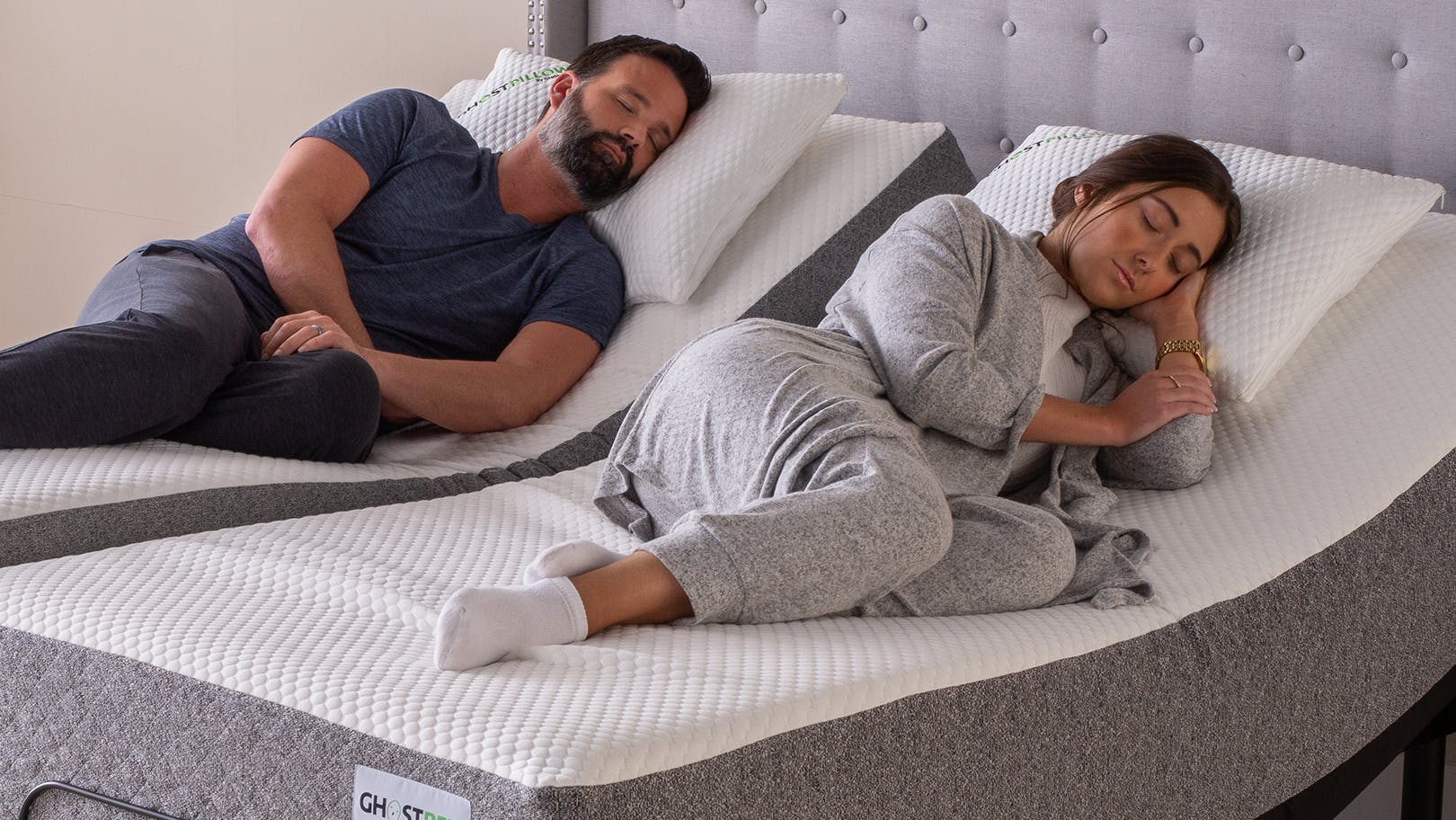9 Benefits of Sleeping With Your Head Elevated
Last Updated on February 22, 2026
by Marc Werner, Founder - GhostBed
What are the benefits of sleeping elevated? Whether you invest in an adjustable power base that lets you raise your head and feet at the touch of a button, or you go the DIY route with a few strategically placed pillows, many people experience better sleep right away when they sleep at an incline. In this article, we'll explore some of the key health benefits and how this sleeping position might help you, too.
Overview: Benefits of Sleeping with Your Head Elevated
Sleeping elevated with your head raised, in particular, has been shown to have many health benefits, alleviating symptoms of many common issues and helping you get the great sleep that your body needs.
Benefits include reduced snoring and relief from other sleep apnea symptoms, migraine relief and post-nasal drip prevention, among others. Many people also get better sleep by elevating their legs simultaneously.

Reduces Mouth Breathing
If your mouth is dry upon waking, then most likely you are mouth breathing while asleep. Your mouth may naturally open as you're sleeping because of nasal obstruction (like if you have a cold), nasal swelling, or even just out of habit.
Mouth breathing is associated with decreased lung function, which can in turn affect the quality of your sleep. It can also dry out your gums, increasing your chances of cavities, plaque and gum disease.
Sleeping on an incline can help, though; with your head raised, you'll open up your airways, which makes breathing through your nose much easier.
Prevents Post-Nasal Drip
The body naturally creates about a quart of mucus each day. Most people won't even notice it, but those with post-nasal drip certainly will as they deal with that familiar trickle down the back of the throat. Post-nasal drip can be detrimental to sleep because it causes you to wake up coughing and hacking as you try to clear the mucus in your throat.
Lying flat allows that mucus to gather in the back of the throat. Keeping the head elevated, on the other hand, can alleviate post-nasal drip because gravity won't be pulling the mucus back.
Curbs Snoring and Sleep Apnea
Snoring may be an indication of sleep apnea, a disorder in which your breathing repeatedly stops and starts as you sleep. Whether it's actually sleep apnea or just simple snoring, your involuntary noises can cause sleep disturbances throughout the night for both you and your partner.
Sleeping elevated will help to curb snoring and promote better breathing. This helps take the pressure off your airway so it's easier for you to breathe.
Improves Blood Circulation
There's a reason that hospitals use adjustable beds for patients with heart issues. Sleeping elevated, with both your head and feet raised in the zero-gravity position promotes blood flow to your heart and helps your circulatory system work more efficiently.
Relieves Shortness of Breath
Even if you don't have a heart condition that affects your circulation, there may be times that you experience shortness of breath while lying down flat. This can be caused by a host of conditions, from medical to psychological. Raising the head of your bed can combat these issues, allowing for better breathing and less chance of being awakened by shortness of breath.


Eases COPD Symptoms
Chronic obstructive pulmonary disease (COPD) actually refers to a group of diseases, including emphysema and chronic bronchitis. People with COPD experience breathing-related problems, especially as they sleep. Essentially, those with COPD may have unhealthy or enlarged lungs, which then flatten their diaphragm, making it more difficult to breathe. Other symptoms like a chronic cough, chest pain, and frequent nighttime urination can also affect sleep. Many patients also have an overlap of COPD and sleep apnea.
Soothes Head Stuffiness
Trying to sleep while sick can be challenging— especially if you're all stuffed up. And lying flat can make it even worse. This is because your sinus passages can't drain properly in this position, resulting in extra sinus and head pressure.
By sleeping elevated, the mucus will be able to drain more easily, allowing you to sleep more peacefully.
Reduces Heartburn Pain
Heartburn and acid reflux are common at night, so if you're struggling with that familiar burning sensation, you're not alone. To help alleviate the pain, try elevating your upper body so that your stomach acids can't travel back up your throat.
Helps with Relaxation
Beyond all the medical benefits, sleeping elevated just feels great! Elevate your legs and feet at the same time to experience the “zero gravity” position, and drift off to sleep in style.
How to Elevate Your Head While Sleeping
Now that you know the benefits of sleeping with your head elevated, what's the easiest way to get into position? There are a few ways to elevate the head of your bed:
- Insert a foam wedge between your mattress and foundation or box spring
- Stack several pillows directly underneath your upper torso and head
- Use an adjustable bed base
The easiest option, of course, is going with the adjustable base. Designed to work with any mattress type, an adjustable base allows you to quickly and easily adjust your head and your feet elevation, helping you to ease chronic pain as well as relax in style.
Relax and put your feet up (literally) with the luxury GhostBed Adjustable Base. Enjoy independent head and foot adjustability, massage settings and more.
Marc has spent the last two decades designing & manufacturing mattresses and other sleep products, drawing on a lifetime of experience working with the material sciences. With several patents to his name, he works closely with the GhostBed team to create products with the perfect balance of comfort & support. Learn More


